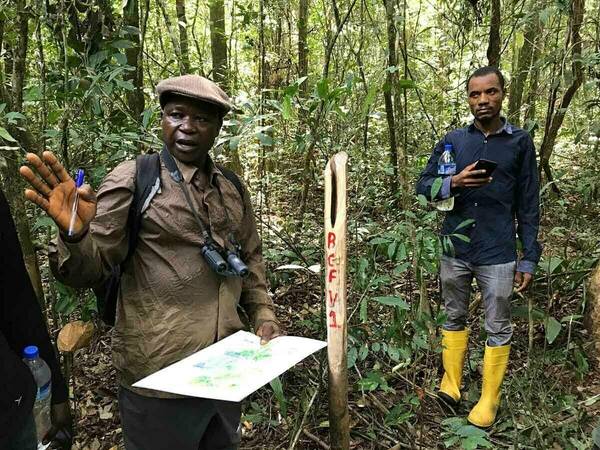Using forest resources strengthens food security, study finds

Forests can reduce hunger in rural households while also capturing carbon and advancing sustainability goals for low- and middle-income countries, according to new research by University of Notre Dame experts.
Households in Liberia that participated in forest-based activities — including collecting and processing timber, hunting bushmeat or gathering edible plants — reduced their food scarcity by 84 percent, according to a study published in the journal Food Security. The research was conducted by Daniel C. Miller, associate professor of environmental policy at Notre Dame’s Keough School of Global Affairs, and co-author Festus Amadu, a former Notre Dame postdoctoral researcher who is now assistant professor of climate policy at Florida Gulf Coast University.
“Previous research has shown that forests benefit people, but now we have evidence on a national scale,” Miller said. “Forests are a vital source of food security for forest-adjacent households in Liberia, the most forested country in West Africa.”
Miller and Amadu analyzed data from a 2019 survey by the Liberian government and the World Bank. Miller, a former World Bank senior forestry specialist, helped design the survey, which collected data from nearly 3,000 households living near forests across all 15 counties in Liberia. The researchers found that when households reported engaging in forest-based activities, they also reported food insecurity for almost three fewer months out of the year.
Food insecurity is severe in many countries in sub-Saharan Africa, including Liberia, where most rural households do not have access to enough food to meet their daily calorie intake requirements for the whole year, Miller said. Causes of this food insecurity include extreme weather events, political instability, and poor agricultural productivity caused by natural resource depletion. Existing research shows that forests may be more resilient to some of these stresses, making them increasingly vital for reducing food insecurity in countries such as Liberia, where forests comprise 69 percent of its land area.
“Forests do a lot of things for us as human beings, and yet their manifold contributions are not systematically studied and documented,” Miller said. “While forests will never substitute for agriculture on any large scale, they can serve as an important food source, particularly in lean times.”
Miller said the study’s methodology — using forest-specific data acquired on a national scale — could be applied to other forest-rich, economically poor countries in West Africa and elsewhere to further understand how forests can mitigate food insecurity.
“Forests can and should be considered by national governments in other countries not only for their climate and environmental benefits, but for their potential to support human development and well-being,” he said.
The research was supported by the Forests & Livelihoods: Assessment, Research and Engagement (FLARE) network, which Miller leads, with funding from Notre Dame Research, the Notre Dame Environmental Change Initiative and the Keough School.
In future studies, Miller and Amadu will examine how forest governance, particularly at the community level, affects how people living near forests can benefit from them. Miller also said the study’s findings have important policy implications and could be used by policymakers focused on forest management and conservation.
“The benefits that forests create for the citizens of a country are yet another reason why forests are worth managing well and conserving,” Miller said. “When you have empirical evidence at the national level, it becomes relevant not only in scholarship but also for the policy realm.”
Originally published by Renée LaReau at keough.nd.edu on July 22.
Contact: Tracy DeStazio, associate director of media relations, 574-631-9958 or tdestazi@nd.edu
Originally published by at news.nd.edu on July 22, 2024.
Latest Research
- Megan McDermott joins ND–IBM Tech Ethics Lab as new Notre Dame directorThe Notre Dame–IBM Technology Ethics Lab, a critical component of the Institute for Ethics and the Common Good (ECG) and the Notre…
- Jenkins Center for Virtue Ethics receives grant to advance love-based ethical frameworkThe University of Notre Dame has received a $10 million grant from the John Templeton Foundation to support a project titled Love and Social Transformation: Empowering Scholars and Social Innovators to Develop the Love Ethic.
- ND-GAIN releases latest Country Index updateThe lastest update to the University of Notre Dame’s Global Adaptation Initiative's (ND-GAIN) Country Index is now live. The ND-GAIN team will release a second Country Index update in late Fall, which includes…
- In sub-Saharan Africa, 1 in 6 cancer medications found to be defectiveSerious quality defects were found in a significant number of cancer medications from sub-Saharan Africa, according to new research from the University of Notre Dame.
- Belfast conference honors legacy of Irish art historian S.B. KennedyMore than 80 people gathered at the Ulster Museum and Queen’s University Belfast on May 22-23 for the conference “New Histories of Irish Art and Modernism.”
- From giving a TEDx Talk to starting a sustainability initiative, one student’s transformational experience in Hong KongWhen Bernice Antoine decided to do a semester abroad in Hong…













